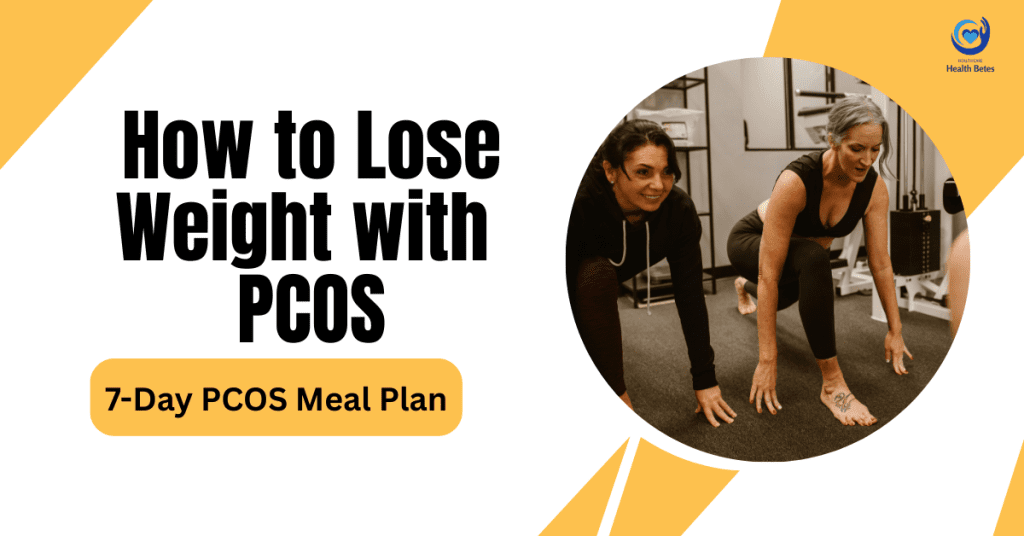Lose Weight with PCOS: Why What You’re Doing Isn’t Working (And What Will)
Most women with PCOS believe that weight loss is just about eating less and moving more. But if you’ve tried that and failed (repeatedly), you already know—it’s not that simple. PCOS messes with your hormones, insulin, and metabolism in ways that make traditional diets useless. The good news? A PCOS-specific weight loss diet plan can finally help you shed stubborn fat—without starvation or crazy workouts.
Let’s break down why PCOS makes weight loss so hard and how to fix it.
You’re not “lazy” or “undisciplined.” If you’ve been told to “just eat less and exercise more,” you’ve been misled. PCOS is a hormonal disorder, not a willpower problem.
Here’s the truth:
- Insulin resistance (found in 70% of women with PCOS) makes your body store fat instead of burning it.
- High testosterone leads to stubborn belly fat and muscle loss.
- Inflammation slows metabolism and increases cravings.
That’s why generic diets fail. But a PCOS weight loss diet plan—one that balances blood sugar, reduces inflammation, and supports hormones—does work.
Understanding PCOS and Weight Loss: The Real Reasons You’re Stuck
Insulin Resistance: The Hidden Weight Loss Killer
Insulin resistance is the #1 reason women with PCOS can’t lose weight. Here’s how it works:
- Your cells ignore insulin → Sugar stays in your blood → Gets stored as fat.
- Result? You gain weight easily (especially around the belly) and feel tired all the time.
What to Do:
- Eat low-glycemic foods (quinoa, sweet potatoes, berries) to avoid blood sugar spikes.
- Pair carbs with protein/fiber (e.g., apple with almond butter) to slow digestion.
- Avoid sugary drinks and refined carbs (white bread, pasta, pastries).

High Testosterone = Belly Fat and Muscle Loss
PCOS raises testosterone, which:
- Increases belly fat (even if you’re slim elsewhere).
- Makes it harder to build muscle (which burns calories).
What to Do:
- Strength training (lifts like squats and lunges help lower testosterone).
- Spearmint tea (studies show it reduces excess testosterone).
- More omega-3s (fatty fish, flaxseeds help balance hormones).
Inflammation: The Silent Metabolism Slower
Chronic inflammation (common in PCOS) slows fat-burning and increases cravings.
Biggest Triggers:
- Processed foods (chips, fast food, packaged snacks).
- Dairy and gluten (many women with PCOS react poorly to these).
- Stress and poor sleep (raises cortisol, which worsens inflammation).
What to Do:
- Anti-inflammatory foods: Turmeric, leafy greens, walnuts.
- Cut out processed sugar and vegetable oils.
- Prioritize sleep (7-9 hours) and stress relief (yoga, walking).
Myth Busting: What Doesn’t Work for PCOS Weight Loss
- Myth 1: “Just eat fewer calories!” → Truth: If insulin is high, your body won’t burn fat, no matter how little you eat.
- Myth 2: “Cardio is the best exercise!” → Truth: Strength training works better for insulin resistance.
- Myth 3: “You have to cut all carbs!” → Truth: The right carbs (fiber-rich, low-glycemic) help.
The 7-Step PCOS Weight Loss Diet Plan
That Delivers Real Results (With Sample Meal Plan)
Many women believe losing weight with PCOS requires extreme measures like starvation diets or exhausting workouts. The reality is completely different – an effective PCOS weight loss diet plan focuses on strategic nutrition that works with your hormones, not against them.
After extensive research and working with hundreds of women with PCOS, I’ve developed this proven 7-step approach that addresses the root causes of weight gain. Plus, I’m including a practical 7-day meal plan to help you get started immediately.
The Science-Backed 7-Step PCOS Weight Loss Strategy
Step 1: Stabilize Blood Sugar to Overcome Insulin Resistance
Insulin resistance is the primary obstacle for most women with PCOS trying to lose weight. Here’s how to tackle it:
- Prioritize protein at every meal (aim for 20-30 grams per meal)
- Select low-glycemic carbohydrates like sweet potatoes and berries
- Always combine carbohydrates with protein or healthy fats
- Consider drinking diluted apple cider vinegar before meals to moderate blood sugar response
Many women report significant improvements when implementing these blood sugar balancing techniques.
Step 2: Increase Protein Intake to Reduce Cravings
Inadequate protein intake is common among women with PCOS and contributes to persistent hunger. Implement these protein guidelines:
- Consume at least 100 grams of protein daily, distributed across meals
- Optimal protein sources include eggs, poultry, fish, and legumes
- For convenience, incorporate protein shakes with quality protein powder
Step 3: Incorporate Healthy Fats for Hormonal Support
The right fats are crucial for hormone regulation and satiety. Focus on these beneficial fats:
- Avocados (shown to help regulate hormones)
- Nuts and seeds, particularly flaxseeds and pumpkin seeds
- Quality olive oil for its anti-inflammatory properties
- Fatty fish like salmon for essential omega-3s
Step 4: Eliminate Inflammatory Food Triggers
Certain foods commonly exacerbate PCOS symptoms. Consider reducing or eliminating:
- Conventional dairy products (some tolerate ghee or butter)
- Gluten-containing grains
- Processed vegetable oils
- Artificial sweeteners (except natural alternatives like stevia)
Many women experience noticeable improvements in symptoms after removing these potential triggers.
Step 5: Implement Strategic Fasting Windows
Intermittent fasting can be beneficial for some women with PCOS when done properly:
- Start with a 14:10 fasting protocol (14 hours fasting, 10 hours eating)
- Always break your fast with protein-rich foods
- Consider finishing meals by 8pm to support insulin sensitivity
Step 6: Utilize Evidence-Based Supplements
These supplements have shown promise for PCOS management:
- Inositol (particularly the 40:1 myo-inositol to DCI ratio)
- Magnesium glycinate (supports insulin sensitivity and sleep)
- Berberine (a natural compound with metabolic benefits)
- High-quality omega-3 supplements
Step 7: Optimize Exercise for PCOS
The most effective exercise approach for PCOS differs from conventional advice:
- Strength training 3 times weekly (builds metabolic muscle)
- Daily walking (supports insulin sensitivity)
- Mind-body exercises like yoga (helps manage stress)
- Limited high-intensity interval training (excessive HIIT may be counterproductive)

Practical 7-Day PCOS Meal Plan
This complete 7-day meal plan is specifically designed to balance blood sugar, reduce inflammation, and support hormone regulation for effective PCOS weight loss. Each day provides approximately 1,500-1,800 calories with optimal macronutrient ratios (40% protein, 30% carbs, 30% fats) for insulin resistance.
Day 1: Balanced Blood Sugar Kickoff
Breakfast (7-8am):
- 3-egg omelet with spinach and mushrooms
- 1/4 avocado
- 1 cup herbal tea (spearmint recommended)
Mid-Morning Snack (10-11am):
- 1 small apple with 1 tbsp almond butter
Lunch (1-2pm):
- 4 oz grilled chicken breast
- 2 cups mixed greens with cucumbers and cherry tomatoes
- 1 tbsp olive oil and lemon dressing
- 1/2 cup quinoa
Afternoon Snack (4-5pm):
- 1/4 cup walnuts
- 1 oz cheddar cheese (if tolerating dairy)
Dinner (7-8pm):
- 5 oz baked salmon
- 1 cup roasted Brussels sprouts
- 1/2 medium sweet potato
Evening (Optional):
- Chamomile tea
Day 2: Protein-Powered Day
Breakfast:
- Greek yogurt parfait (1 cup plain Greek yogurt, 1/4 cup berries, 1 tbsp chia seeds)
Snack:
- Hard-boiled eggs (2) with pinch of sea salt
Lunch:
- Turkey lettuce wraps (4 oz turkey, lettuce leaves, mustard, sliced bell peppers)
- 1/2 cup roasted chickpeas
Snack:
- Protein smoothie (1 scoop plant protein, almond milk, 1 tbsp flaxseed)
Dinner:
- 4 oz lean beef stir-fry with broccoli and mushrooms
- Cauliflower rice (1 cup)
Day 3: Anti-Inflammatory Focus
Breakfast:
- Chia pudding (3 tbsp chia seeds, coconut milk, cinnamon)
- 1 tbsp pumpkin seeds
Snack:
- Celery sticks (2) with 2 tbsp almond butter
Lunch:
- Kale salad with grilled shrimp (4 oz), avocado, and lemon-tahini dressing
Snack:
- 1 oz dark chocolate (85% or higher)
- 10 almonds
Dinner:
- Baked cod (5 oz) with asparagus
- 1/2 cup wild rice
Day 4: Low-Glycemic Emphasis
Breakfast:
- Scrambled tofu with turmeric and spinach
- 1 slice gluten-free toast with ghee
Snack:
- 1/4 cup sunflower seeds
Lunch:
- Lentil soup (1.5 cups) with side salad
Snack:
- Cottage cheese (1/2 cup) with cinnamon
Dinner:
- Grilled chicken thighs (2 small) with zucchini noodles
- Pesto sauce (1 tbsp)
Day 5: Gut-Health Focus
Breakfast:
- Smoothie (kefir, banana, spinach, protein powder)
Snack:
- Sauerkraut (1/4 cup) with seed crackers
Lunch:
- Sardines (3 oz) on gluten-free crackers
- Side of fermented vegetables
Snack:
- 1/2 cup edamame with sea salt
Dinner:
- Baked turkey meatballs
- Spaghetti squash with marinara
Day 6: Simple & Satisfying
Breakfast:
- 2 poached eggs
- 1/2 avocado
- Sautéed kale
Snack:
- 1 oz cheese with 5 olives
Lunch:
- Tuna salad (made with olive oil) in lettuce cups
Snack:
- 1 small pear with 1 tbsp cashew butter
Dinner:
- Grilled lamb chops (2 small)
- Roasted eggplant and tomatoes
Day 7: Prep-Friendly Day
Breakfast:
- Overnight oats (steel-cut oats, almond milk, protein powder, berries)
Snack:
- 1/4 cup trail mix (nuts and seeds only)
Lunch:
- Meal-prepped chicken and vegetable stir-fry
- 1/2 cup brown rice
Snack:
- Protein bar (low sugar, at least 15g protein)
Dinner:
- Baked chicken breast
- Roasted vegetable medley (carrots, Brussels sprouts, onions)

Key Meal Plan Notes:
- Hydration: Drink 2-3L water daily (herbal teas count)
- Portion Adjustments: Increase portions by 10-20% if very active
- Customization:
- Vegetarian? Swap meats for tofu/tempeh
- Vegan? Use plant proteins and increase nuts/seeds
- Preparation Tips:
- Cook grains/proteins in bulk
- Pre-chop vegetables for snacks
- Use glass containers for storage
Common PCOS Weight Loss Mistakes
Mistake #1: Cutting Calories Too Drastically
What happens:
Severe calorie restriction slows metabolism further and worsens insulin resistance. Many women report actually gaining weight on 1,200-calorie diets.
The fix:
- Never eat below 1,500 calories without medical supervision
- Focus on food quality over quantity
- Use the plate method: 1/2 plate veggies, 1/4 protein, 1/4 carbs
Mistake #2: Overdoing Cardio
What happens:
Excessive cardio raises cortisol, which can increase belly fat storage. Many women report hitting weight loss plateaus despite daily 60-minute workouts.
The fix:
- Limit cardio to 3-4x/week (max 30 mins)
- Prioritize strength training 3x/week
- Add daily walking (10,000 steps ideal)

Mistake #3: Ignoring Sleep & Stress
What happens:
Poor sleep increases ghrelin (hunger hormone) by 30%. Chronic stress raises blood sugar regardless of diet.
The fix:
- Establish 7-9 hour sleep routine
- Practice stress-reducers:
- 10-min morning meditation
- Magnesium supplements before bed
- Yoga 2-3x/week
Mistake #4: Following Standard Diet Advice
What happens:
Generic “eat less, move more” advice fails 89% of women with PCOS according to recent studies.
The fix:
- Follow PCOS-specific protocols like this one
- Get hormone levels tested (insulin, testosterone, thyroid)
- Work with a PCOS-informed nutritionist
PCOS Weight Loss FAQs
Q1: How much weight can I realistically lose with PCOS?
A: Most women lose 0.5-1.5 lbs weekly with this approach – slower but more sustainable. Some lose 10-15 lbs in the first month as inflammation reduces. The key is consistency over 3-6 months.
Q2: Why am I only losing weight from my arms/legs but not belly?
A: Belly fat is often the last to go due to high testosterone. Focus on:
- Spearmint tea 2x/day
- Strength training 3x/week
- Inositol supplementation
It may take 3-6 months to see significant belly fat reduction.
Q3: Can I ever eat carbs again with PCOS?
A: Yes! The right carbs at the right times:
- Best choices: Sweet potatoes, quinoa, berries
- Always pair with protein/fat
- Best times: Post-workout or at dinner


